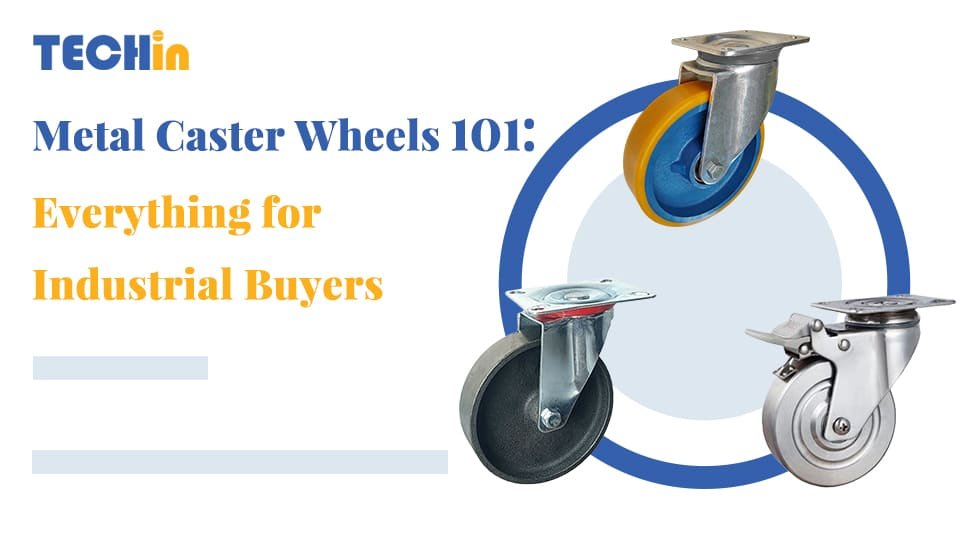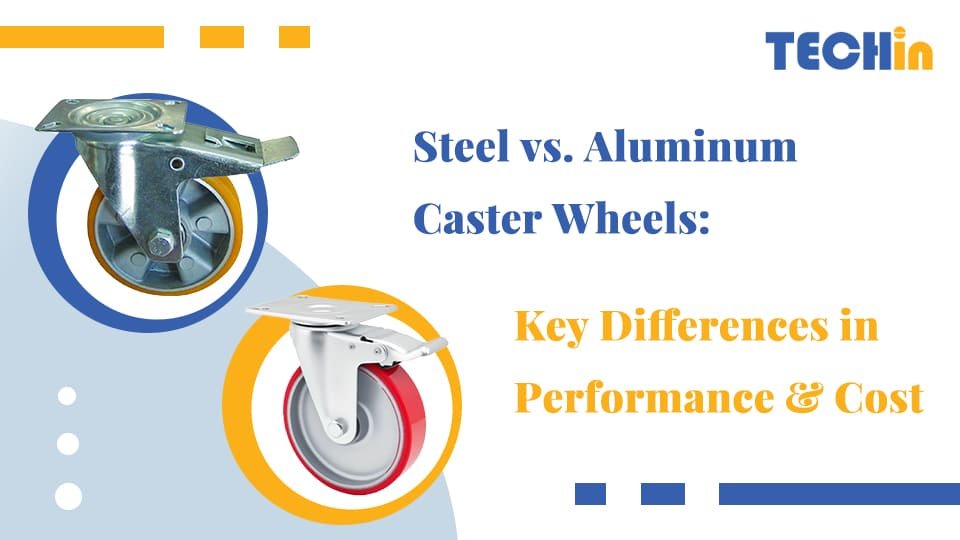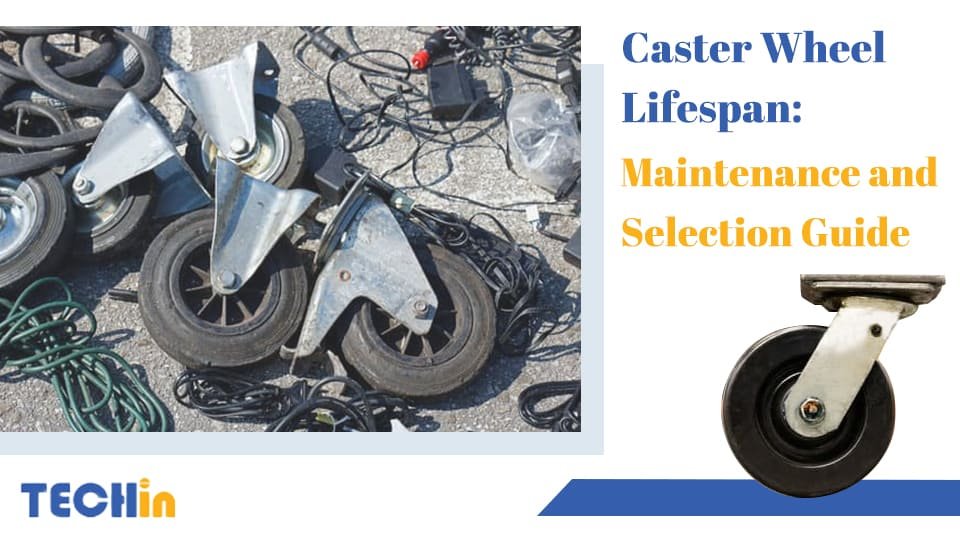Material handling is the backbone of countless industries, enabling the efficient movement of goods, machinery, and equipment. However, the unsung heroes of this process—industrial castor wheels—rarely get the attention they deserve. These small but mighty components play an essential role in keeping industrial operations safe, productive, and efficient.
Industrial castor wheels are critical for material handling equipment because they provide reliable mobility, reduce manual labor, and improve safety. Designed with innovative materials like polyurethane, TPU, and PA6, these wheels adapt to challenging environments while delivering unmatched durability and performance.

In this ultimate guide, we’ll explore the features, applications, and latest innovations that make industrial castor wheels essential for material handling.
What Makes Industrial Castor Wheels Crucial for Material Handling Equipment?
The demands of material handling—be it in warehouses, factories, or logistics centers—require solutions that optimize efficiency and safety. Industrial castor wheels meet these demands through their remarkable benefits:
1. Effortless Mobility
Industrial castor wheels significantly reduce friction, allowing equipment and goods to move seamlessly across various surfaces. Whether navigating tight warehouse aisles or transporting machinery across production floors, castor wheels provide smooth and precise movement. This ensures faster workflows and prevents delays, enabling businesses to meet tight schedules.
2. Enhanced Workplace Safety
Heavy loads can pose serious risks to workers, especially when moved manually. Castor wheels eliminate the need for lifting or dragging, reducing the likelihood of injuries such as muscle strains or equipment mishaps. Additionally, castor wheels with advanced braking systems ensure stability during stationary operations, providing an added layer of safety.
3. Protection for Floors and Equipment
High-quality castor wheels minimize wear and tear on floors by distributing weight evenly and preventing scuffs or scratches. Shock-absorbing materials like polyurethane and rubber also reduce vibrations, protecting sensitive equipment and fragile goods from damage during transport.
4. Boosted Productivity
By enabling smooth and reliable movement, castor wheels save time and effort. Workers can focus on core tasks rather than struggling with inefficient transportation, improving overall productivity in fast-paced industrial environments.
Key Features of Industrial Castor Wheels
Industrial castor wheels are built to withstand the demands of challenging environments. Here are the standout features that make them invaluable:
1. Exceptional Load Capacity
Industrial castor wheels are designed to handle extreme loads, from hundreds to thousands of kilograms. Reinforced structures and high-strength materials ensure stability and performance even under the heaviest loads, making them indispensable for material handling.
2. Durable Materials
Modern castor wheels utilize advanced materials such as:
- Polyurethane (PU): Combines durability with floor protection, ideal for high-traffic areas.
- Thermoplastic Polyurethane (TPU): Offers exceptional wear resistance and smooth movement, ideal for heavy-duty applications.
- PA6 (Nylon 6): A lightweight yet robust option, perfect for environments with extreme temperatures or moisture.
These materials ensure long-lasting performance and reduced maintenance costs.
3. Corrosion and Weather Resistance
In industrial settings where moisture, chemicals, or extreme temperatures are common, corrosion-resistant materials like TPU and metal alloys are crucial. These wheels maintain their performance even in the harshest conditions, making them suitable for both indoor and outdoor use.
4. Advanced Maneuverability
Friction-reducing bearings and swivel mechanisms allow castor wheels to pivot smoothly and roll effortlessly, even in tight spaces. This feature enhances operational efficiency and reduces strain on workers.
5. Floor Adaptability
Industrial castor wheels are engineered to navigate diverse surfaces, from smooth concrete to rough terrain. This adaptability minimizes the risk of accidents and ensures consistent performance across different environments.
Top Materials for Industrial Castor Wheels
The choice of material directly impacts the durability, performance, and versatility of industrial castor wheels. Below are the most effective materials and their benefits:
1. Polyurethane (PU)


- Advantages: Wear resistance, floor protection, shock absorption, and noise reduction.
- Best For: Indoor environments such as offices, warehouses, and hospitals.
2. Elastic Rubber



- Advantages: Noise reduction, non-marking properties, and smooth movement over uneven surfaces.
- Best For: Healthcare, retail, and environments requiring low noise levels.
3. Cast Iron



- Advantages: Exceptional strength and durability, ideal for heavy-duty applications.
- Best For: Construction, manufacturing, and outdoor use on rough surfaces.
4. TPU (Thermoplastic Polyurethane)



- Advantages: Superior wear resistance, chemical resistance, and high load capacity.
- Best For: Industrial applications requiring durability and smooth operation.
5. PA6 (Nylon 6)



- Advantages: Lightweight, robust, and resistant to moisture and extreme temperatures.
- Best For: Environments with fluctuating temperatures or exposure to water and chemicals.
Applications of Industrial Castor Wheels in Material Handling
The versatility of industrial castor wheels makes them essential across a wide range of industries. Here are some of their most common applications:
1. Warehouses and Distribution Centers
In warehouses, castor wheels are used in trolleys, carts, and pallet jacks to move goods efficiently. Their smooth movement reduces loading and unloading times, streamlining supply chain operations.
2. Manufacturing Plants
In manufacturing facilities, castor wheels support heavy machinery, tools, and raw materials. They allow for easy repositioning of equipment, helping businesses adapt to changing production needs.
3. Healthcare and Retail Environments
Rubber and polyurethane wheels are often used in hospital beds, medical carts, and retail shelving units due to their quiet operation and floor protection properties.
4. Construction and Heavy-Duty Applications
Cast iron and metal alloy wheels are perfect for construction sites, where they handle heavy machinery and navigate uneven terrain with ease.
5. Custom Solutions
From robotics to conveyor systems, castor wheels are tailored for specialized applications, offering precision and reliability in advanced industrial setups.
Latest Trends in Industrial Castor Wheels for Material Handling
The industrial castor wheel market is constantly evolving, driven by innovations that enhance efficiency, safety, and sustainability. Here are the latest trends:
- Advanced Materials: TPU and PA6 are leading the way with enhanced durability, load-bearing capacity, and resistance to wear and environmental factors.
- Ergonomic Enhancements: Features like swivel mechanisms, friction-reducing bearings, and braking systems make castor wheels easier to use and safer for workers.
- Sustainability Initiatives: Eco-friendly materials and recyclable designs are becoming increasingly popular, reducing environmental impact.
- IoT-Enabled Castor Wheels: Smart castor wheels equipped with sensors allow for real-time monitoring of performance, enabling predictive maintenance and reducing downtime.
How Industrial Castor Wheels Reduce Downtime in Manufacturing
Downtime is a major challenge in manufacturing, leading to lost productivity and revenue. Industrial castor wheels help reduce downtime through:
- Durable Materials: Long-lasting materials like TPU and polyurethane minimize wear and tear, reducing the need for replacements.
- Efficient Design: Advanced bearings and swivels improve movement, reducing delays and maintenance efforts.
- Proactive Monitoring: IoT-enabled wheels provide data on wear and load, helping businesses address issues before they become critical.
Choosing the Right Industrial Castor Wheels for Your Business
Selecting the perfect castor wheels involves considering several factors:
- Load Capacity: Match the wheels to the weight of your equipment and cargo.
- Material Compatibility: Choose materials based on your environment, such as rubber for quiet operations or TPU for chemical resistance.
- Floor Type: Ensure the wheels are suitable for your flooring to prevent damage.
- Environmental Conditions: Consider exposure to chemicals, moisture, and temperature fluctuations.
- Maneuverability Requirements: Opt for swivel wheels for greater flexibility or fixed wheels for stability.
Conclusion
Industrial castor wheels are essential for efficient material handling. From their advanced materials and ergonomic designs to their role in reducing downtime, these wheels have revolutionized mobility across industries.
For more questions or needs, reach us at:
- Email: info@techincastor.com
- Tel/WhatsApp: +86 13417057114










